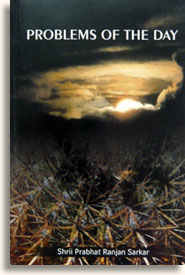Problems of the Day
| Problems of the Day | |
|---|---|
 "Problems of the Day": the front cover[note 1] | |
| Author | Prabhat Ranjan Sarkar |
| Language | English |
| Subject | Philosophy |
| Publisher | Ananda Marga-Ananda Publications |
| Publication date | October 1958 (IND) |
| Media type | |
| Pages | 50 |
| ISBN | 81-7252-19-0 |
| Location in Sarkarverse | |
Problems of the Day is a book of 50 pages published for the first time on January 26, 1958 in Trimohan, Bhagalpur (India) by the philosopher and social reformer Prabhat Ranjan Sarkar aka Shrii Shrii Anandamurti (1921–1990).[note 2] The original title (until 1996) was "Problem of the Day" (Ajker Samasya - samasya - translates as either "problem" or "problems"). The book was dedicated to the Indian freedom fighter Subhas Chandra Bose.[note 3]
The volume ends with the statement “Human beings of the world, unite!” followed by the Vaedika shloka:
"Parama Purusa (Supreme Consciouness) is my Father, Parama Prakrti (Supreme Operative Principle) is my Mother, and the Universe is my homeland. We are all citizens of this universe. The universe is the thought-projection of the Macrocosmic Mind, and it is in the extroversial and introversial phases of the Cosmic imaginative flow that the creation, preservation and destruction of all entities continues."
Saḿgacchadhvaḿ saḿvadadhvaḿ saḿ vo manáḿsi jánatám, Devábhágaḿ yathápúrve saḿjánáná upásate. Samánii va ákútih samáná hrdayánivah, Samánamastu vo mano yathá vah susahásati.
- ("Let us move together, let us radiate the same thought-wave, let us come to know our minds together, Let us share our wealth without differentiation, like sages of the past, so that all may enjoy the universe. Let our aspirations be united, let our hearts be inseparable, Let our minds be as one mind, so that we live in harmony and become one with the Supreme").[1]
Dedication
The book was dedicated to Indian freedom fighter Subhas Chandra Bose. The dedication message of the book was —
To the great hero Shrii Subhash Chandra Bose whom I did love and whom I do love even now
Synopsis
The book is divided into 37 short chapters.
Chapter 1
Parama Purusa is one's father and Parama Prakrti is one's mother and all are citizens of this universe. The universe is a though projection of the macrocosmic mind and everything in the universe belong to him. Sarkar explained this as—
| “ | When an individual imagines an object, then that person alone, and no one else, is the owner of the object. For example, when an imaginary human being roams about in an imaginary green field, the imaginer, and not the imaginary person, is the owner of the field. The universe is the thought projection of Brahma [the Supreme Entity], so the ownership of the universe lies with the Supreme Entity, and not with His imagined beings. | ” |
The entire universe is a vast joint family and everything in the nature is common property of everyone. Nature or Dharma does not permit someone to acquire immense amount of wealth. Sarkar called the capitalists of the modern world as "anti-social" and told capitalism can not be supported.
Chapter 2
In this chapter Sarkar talked on "eradication of capitalism". The best thing could be if it was possible to eradicate capitalism by friendly persuasion and humanly approach. But Sarkar told, it was not and is not possible, not everyone will respond to this approach.
That's why to eradicate capitalism, one needs to apply force. Strong measures need to be taken and "tremendous circumstantial pressure" need to be created to eradicate capitalism from the society.
Chapter 3
In this chapter Sarkar expressed his dislike towards the practice of denouncing capitalism at every opportunity, because this allows capitalists to become alert to find more ways to exploit the people.
Chapter 4
Sarkar told, the ambition of becoming rich by exploiting others is a psychic disease. Longing of human mind is infinite but this longing does not find proper path that leads to psychic and spiritual fulfillment and engages in accumulating enormous amount of wealth by depriving and exploiting others. The incapability to recognize others' requirements because of lack of sensitiveness is a psychic disease, but the people who are suffering from this disease are also our brothers and sisters. So initiatives must be taken by by making humanitarian appeals or by applying force to cure their disease of exploiting others.
Chapter 5
In this chapter Sarkar told, even if extreme steps, such as applying force or making circumstantial pressure, is taken, it can not be said, those people will be totally reformed. Rather, they will search for suitable opportunity to launch a counter-attack or counter-revolution. That's why to protect common people from the clutches of exploiters and to totally reform the characters of these ailing people, long-term arrangements need to be made for their spiritual and psychic education.
References
Footnotes
- ^ "Problems of the Day" as it appears on the publisher's web site, Ananda Marga Publications, 2012, retrieved 24 December 2012
- ^ Between 1955 and 1990 the author wrote in English, Bengali and Hindi. He wrote in the name "Shrii Prabhat Ranjan Sarkar" when treating sociology, economics, philology and various other subjects, and in the name ""Shrii Shrii Ánandamúrti"" when focusing on spiritual topics. Many of his books he gave as dictations; others were compiled from his discourses, some of them in small pocket-books.
- ^ Problems of the Day
Citations
- ^ a b Sarkar 1958.
Sources
- Sarkar, Prabhat Ranjan (1958), Problems of the Day, Kolkata: Ananda Marga Publications, ISBN 81-7252-19-0 Check
|isbn=value (help)
